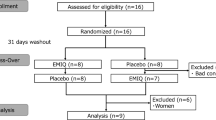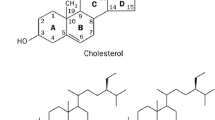Abstract
This study was undertaken to compare the effects on plasma cholesterol concentration of a new isolated soy protein in which the protein structure is kept in its native, nondenaturated form (verum 1) versus a conventional isolated soy protein (verum 2) and milk protein (placebo). This prospective, randomized, double-blind, placebo-controlled study was conducted in an outpatient clinical study center in Berlin, Germany. Over 8 wk, 120 patients (total cholesterol, 5.2–7.8 mmol/L) were given verum 1, verum 2, or placebo at a dosage of 25 g protein daily. At the end of the treatment period, total cholesterol levels were significantly reduced by 10.7% in the verum 1 group compared with placebo (P < .001), and levels were reduced by 5.8% in the verum 2 group (P=.008). The difference between the 2 verum groups was statistically significant (P=.008). Low-density lipoprotein cholesterol levels were significantly reduced with nondenaturated isolated soy protein only: levels were reduced by 9.4% in the verum 1 group (P=.002) and by 4.9% in the verum 2 group (P=.107). Again, the difference between the verum groups was significant (P=.05). The results of this study confirm that supplementation with isolated soy protein can lead to significant reductions in plasma concentrations of total and low-density lipoprotein cholesterol. These reductions are significantly more pronounced with an isolated soy protein that maintains the native protein structure than with a commercially available reference isolated soy protein.
Similar content being viewed by others
References
Law MR, Wald MJ, Thompson SG. By how much and how quickly does reduction in serum cholesterol concentration lower the risk of ischaemic heart disease?BMJ. 1994; 308: 367–373.
Baigent C, Keech A, Kearney PM, et al, Cholesterol Treatment Trialists’ (CTT) Collaborators. Efficacy and safety of cholesterol-lowering treatment: prospective meta-analysis of data from 90,056 participants in 14 randomised trials of statins.Lancet. 2005; 366: 1267–1278.
Ramsay IE, Yeo WW, Jackson PR. Dietary reduction of serum cholesterol concentration: time to think again.BMJ. 1991; 303: 953–957.
Anderson JW, Johnstone BM, Cook-Newell ME. Meta-analysis of the effects of soy protein intake on serum lipids.N Engl J Med. 1995; 333: 276–282.
Baum JA, Teng H, Erdman JW, et al. Long-term intake of soy protein improves blood lipid profiles and increases mononuclear cell low-density lipoprotein receptor messenger RNA in hypercholesterolemic, postmenopausal women.Am J Clin Nutr. 1998; 68: 545–551.
Wong WW, Smith EOB, Stuff JE, Hachey DL, Heird WC, Pownell HJ. Cholesterol-lowering effect of soy protein in normocholesterolemic and hypercholesterolemic men.Am J Clin Nutr. 1998; 68(suppl): 1385S-1389S.
Crouse JR, Morgan T, Terry JG, Ellis J, Vitolins M, Burke GL. A randomized trial comparing the effect of casein with that of soy protein containing varying amounts of isoflavones on plasma concentrations of lipids and lipoproteins.Arch Intern Med. 1999; 159: 2070–2076.
Washburn S, Burke GL, Morgan T, Anthony M. Effects of soy protein supplementation on serum lipoproteins, blood pressure, and menopausal symptoms in perimenopausal women.Menopause. 1999; 6: 7–13.
Merz-Demlow BE, Duncan AM, Wangen KE, et al. Soy isoflavones improve plasma lipids in normocholesterolemic, premenopausal women.Am J Clin Nutr. 2000; 71: 1462–1469.
Teixeira SR, Potter SM, Weigel R, Hannum S, Erdman JW, Hassler CM. Effects of feeding 4 levels of soy protein for 3 and 6 wk on blood lipids and apolipoproteins in moderately hypercholesterolemic men.Am J Clin Nutr. 2000; 71: 1077–1084.
Hermansen K, Sondergaard M, Hoie L, Carstensen M, Brock B. Beneficial effects of a soy-based dietary supplement on lipid levels and cardiovascular risk markers in type 2 diabetic subjects.Diabetes Care. 2001; 24: 228–233.
Puska P, Korpelainen V, Hoie LH, Sksovlund E, Lahti E, Smerud KT. Soy in hypercholesterolaemia: a double-blind, placebo-controlled trial.Eur J Clin Nutr. 2002; 56: 352–357.
Tonstad S, Smerud KT, Hoie L. A comparison of the effects of 2 doses of soy protein or casein on serum lipids, serum lipoproteins, and plasma total homocysteine in hypercholesterolemic subjects.Am J Clin Nutr. 2002; 76: 78–84.
Dewailley P, Moulin S, Rouget JP, Sezille G, Jaillard J. Effects of polyenylphosphatidyl choline on lipoproteins in patients with hypercholesterolemia.Med Welt. 1985; 36: 367–369.
Kirsten R, Heintz B, Nelson K, et al. Polyenylphosphatidylcholine improves the lipoprotein profile in diabetic patients.Int J Clin Pharmacol Ther. 1994; 32: 53–56.
Lo GS, Goldberg AP, Lim A, Grundhauser JJ, Anderson C, Schonfeld G. Soy fiber improves lipid and carbohydrate metabolism in primary hyperlipidemic subjects.Atherosclerosis. 1986; 62: 239–248.
Ovesen L, Ebbesen K, Olesen E. The effects of oral soybean phospholipid on serum total cholesterol, plasma triglyceride, and serum high-density lipoprotein cholesterol concentrations in hyperlipidemia.J Parenter Enter Nutr. 1985; 9: 716–719.
Sirtori CR, Zucchi-Dentone C, Sirtori M, et al. Cholesterol-lowering and HDL-raising properties of lecithinated soy proteins in type II hyperlipidemic patients.Ann Nutr Metab. 1985; 29: 348–357.
Wangen KE, Duncan AM, Xu X, Kurzer MS. Soy isoflavones improve plasma lipids in normocholesterolemic and mildly hypercholesterolemic postmenopausal women.Am J Clin Nutr. 2000; 73: 225–231.
Lovati MR, Manzoni C, Canavesi A, et al. Soybean protein diet increases low density lipoprotein receptor activity in mononuclear cells from hypercholesterolemic patients.J Clin Invest. 1987; 80: 1498–1502.
Lovati MR, Manzoni C, Corsini A, et al. Low density lipoprotein receptor activity is modulated by soybean globulins in cell culture.J Nutr. 1992; 122: 1971–1978.
Lovati MR, Manzoni C, Gianazza E, Sirtori CR. Soybean protein products as regulators of liver low-density lipoprotein receptors. I. Identification of active beta-conglycinin subunits.J Agr Food Chem. 1998; 46: 2474–2480.
Lovati MR, Manzoni C, Gianazza E, et al. Soy protein peptides regulate cholesterol homeostasis in Hep G2 cells.J Nutr. 2000; 130: 2543–2549.
Manzoni C, Lovati MR, Gianazza E, Morita Y, Sirtori CR. Soybean protein products as regulators of liver low-density lipoprotein receptors. II. Alpha prime rich commercial soy concentrate and alpha prime deficient mutant differently affect low-density lipoprotein receptor activity.J Agr Food Chem. 1998; 46: 2481–2484.
Sirtori CR, Lovati MR, Manzoni C, et al. Reductions of serum cholesterol by soy proteins: clinical experience and potential molecular mechanism.Nutr Metab Cardiovasc Dis. 1998; 8: 334–340.
Gianazza E, Eberini I, Arnoldi A, Wait R, Sirtori CR. A proteomic investigation of isolated soy proteins with variable effects in experimental and clinical studies.J Nutr. 2003; 133: 9–14.
Wood D, de Backer G, Faergeman O, Graham I, Mancia G, Pyörälä K. Prevention of coronary heart disease in clinical practice. Summary of Recommendations of the Second Task Force of European and Other Societies on Coronary Prevention.Eur Heart J. 1998; 19: 1434–1503.
Damasceno NR, Gidlund MA, Goto H, Dias CT, Okawabata FS, Abdalla DS. Casein and soy protein isolate in experimental atherosclerosis: influence on hyperlipidemia and lipoprotein oxidation.Ann Nutr Metab. 2001; 45: 38–46.
Author information
Authors and Affiliations
Corresponding author
Rights and permissions
About this article
Cite this article
Hoie, L.H., Guldstrand, M., Sjoholm, A. et al. Cholesterol-lowering effects of a new isolated soy protein with high levels of nondenaturated protein in hypercholesterolemic patients. Adv Therapy 24, 439–447 (2007). https://doi.org/10.1007/BF02849913
Issue Date:
DOI: https://doi.org/10.1007/BF02849913




